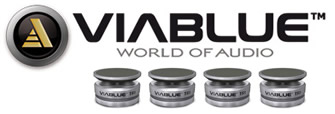En commandant ce DAC, je ne m'attendais pas à une telle qualité... Le montage est un jeu d'enfant pour qui est un tantinet bricoleur et précautionneux. Le résultat est vraiment classe. L'installation de Volumio et son utilisation sont vraiment simples. J'ai testé toutes les entrées, le résultat est extraordinaire, du détail, spatialisation, richesse des timbres... Pour avoir mieux et clé en main, il faut investir vraiment beaucoup plus. Ça vaut vraiment le coup, mais il ne faut pas hésiter à investir dans une alimentation de qualité. Audiophonics propose des modules qui donnent d'excellents résultats audibles avec plus de détails, par exemple le PSU S4-HP. Malgré toutes mes éloges, j'ai quand même une préférence pour l'entrée coaxiale, avec comme source, le RaspTouch DigiOne qui donne à mes oreilles, de meilleurs résultats en termes de restitution avec des timbres plus riches qu'avec le RPI du DAC pour lire mes CD numérisés sur disque dur. Je recommande particulièrement ce DAC et remercie l'équipe Audiophonics pour ses conseils et sa disponibilité.
New Customer?
Create your accountNo products
Prices are tax included
By buying this product you get 42 loyalty points
Pack content
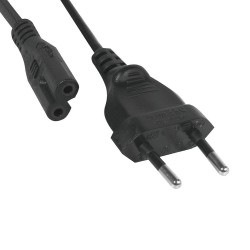
1 x Standard power cord IEC C7 2 pole 2x0.75mm² 1.8m
In Stock2,70 € 2,25 € Tax excl.In Stock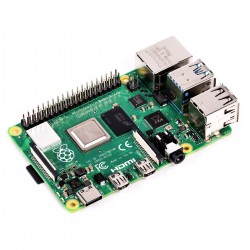

1 x RASPBERRY PI 4 MODEL B RAM 2Gb Micro HDMI Ethernet Gigabit WiFi Bluetooth 5.0 4x USB 1.5GHz
In Stock75,00 € 62,50 € Tax excl.In Stock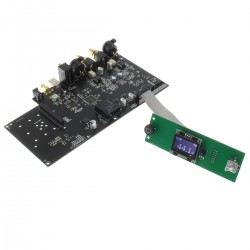
1 x AUDIOPHONICS EVO-SABRE Balanced DAC 2x ES9038Q2M USB GPIO Raspberry Pi SPDIF Bluetooth XLR RCA
In Stock209,00 € 174,17 € Tax excl.In Stock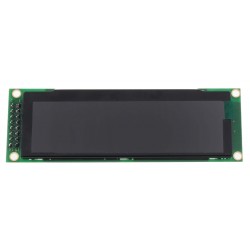
1 x White SPI / IIC 256x64 OLED 3.12" screen
In Stock29,90 € 24,92 € Tax excl.In StockAccessories for this product
This EVO-DAC kit can operate in pure DAC mode immediately after mounting.
ATTENTION: In order to take advantage of the network drive function of this product, you will need to install an Audiophonics software image containing the scripts for the display and the network. These are available here : Images EVO-SABRE DACCompatibility update: Evo Sabre x Volumio 4
- The Volumio compatibility plugin for Evo Sabre is available here: Volumio 4 x Evo Sabre plugin
- The power management plugin is available here: Audiophonics On/Off (MCU)
- The driver and hardware volume control for the ES9018K2M/ES9028Q2M/ES9038Q2M DAC range is available here: Driver and hardware volume control
- The GPIO power button management plugin with LED (alternative without microcontroller) is available here: GPIO Button LED plugin for Volumio 4EVO DAC
Kit DAC 2x 9038Q2M 32bit full balanced 768kHz / Streamer Raspberry Pi 4
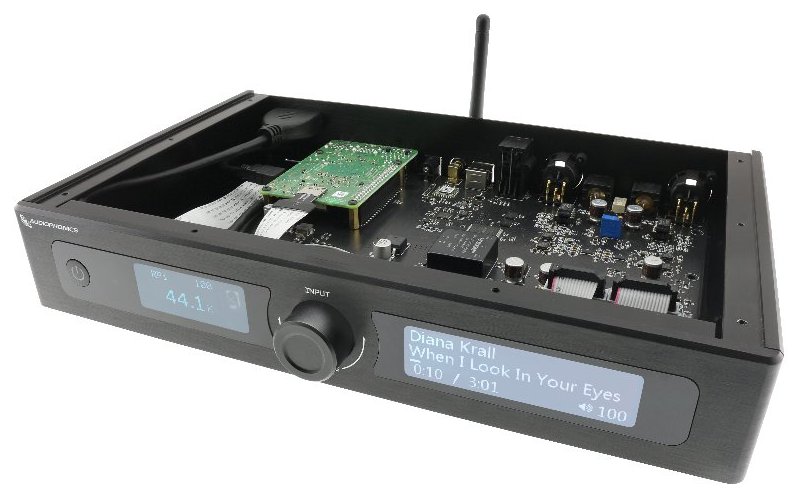
This is the full kit version. It includes all elements (electronics + box + options including Raspberry Pi 4, remote control & power supply) required to assemble a functional SABRE-EVO DAC from scratch.
This do-it-yourself kit lets you mount your own balanced DAC based on an ES9038Q2M chip combo.
With its 100% aluminum housing, its dual screens, its rotary selector, its remote control and its extensive connectivity, this kit is a perfect opportunity to grasp the essentials of a latest generation professional quality high-fidelity decoder.
This Do It Yourself approach brings vast possibilities. The DAC EVO-SABRE card is indeed equipped with all the necessary connectors to accommodate a Raspberry Pi (supplied). This extension transforms the DAC into a real dematerialized playback solution, capable of streaming your high definition audio files from a multitude of different sources thanks to generous connectivity, wired (coaxial S / PDIF, optical, USB audio, USB storage) as well as wireless (Wi-Fi, bluetooth 5.0 with all relevant audio protocols). To go even further, the caseeven allows easy access to the video connector and the SD support of the Raspberry Pi 4 card.
All you have to do is choose & install one of the many free software reading solutions and connect the card to an amplifier or active speakers to benefit from a complete high-fidelity package, rich in functionality and ready to use. 'employment.ASR Review
I am happy to recommend the Audiophonics EVO Sabre given the unique functionality, form factor, and performance.

EVO DAC Sabre audio circuit
Double DAC ES9038 integrated in balanced mode

The EVO-Sabre is a high-precision DAC using two 32-bit ES9038Q2M Sabre chips integrated in dual Mono mode: each of these chips see its computing power 100% dedicated to a single channel of the stereophonic signal. This achieves a sound restitution of exceptional clarity with tremendously low crosstalk.
This component belongs to ESS flagship series and is among the best current hardware solutions for high-fidelity audio decoding. It uses HyperStream 32 BIT 768kHz architecture with native DSD support. Each one of this chips is also equipped with advanced reconstruction filters and uses some of the finest dithering techniques available on the audio market.
ESS ES9038Q2M SABRE DACs are also very popular thanks to their ability to operate volume with almost no consequences on the audio bitrate.
The board works in balanced and single-ended mode and offers both a balanced stereo output on 3-pole XLR connector and an single-ended stereo output on RCA connector. The module can thus be ideally suited to most integration scenarios and will easily find its place in minimalist audio projects as well as in very complex Hi-Fi installations.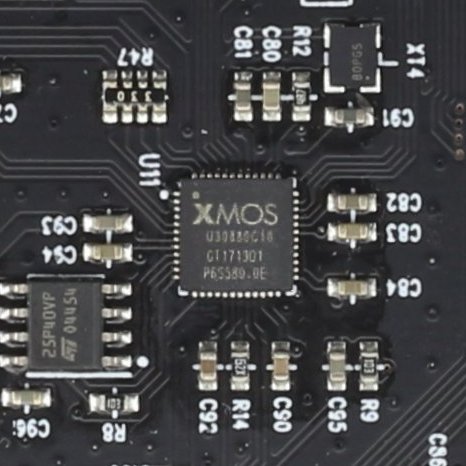
XMOS U208 USB Interface
The USB-B input (USB-2) works with a XMOS U208 USB interface. This is a reference component in the field of high-fidelity music, with digital streams supports up to 32-bit 768kHz as well as (native) DSD512.
Definitely designed for high-resolution, this asynchronous USB interface has a computation capacity of 1000 MIPS all of which is dedicated to the processing of your digital audio signals with minimal jitter and noise.
When the DAC EVO-SABRE is used in conjunction with a Raspberry Pi, this high-definition USB input allows to immediately interface digital audio streams to RPI I2S up to 384kHz / DOP 128.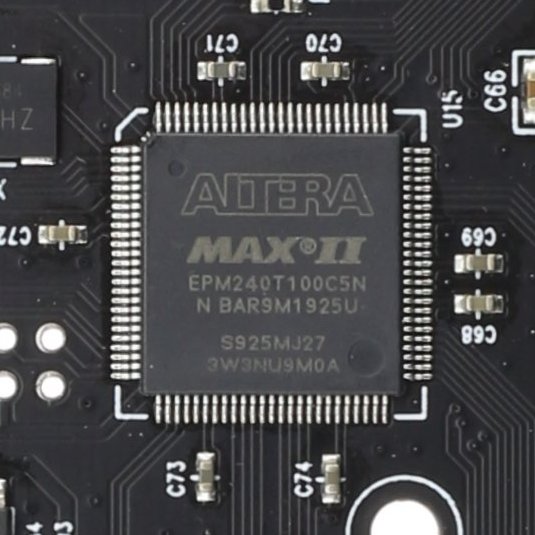
FGPA Altera Max
Unlike its predecessor, the EVO-SABRE has several inputs driven by an independent interface.
SPDIF signals are handled by a FGPA Altera Max capable of performing clean processing of the digital input streams. These digital signals are interfaced in I2S to each of the two DAC chips, which represents a significant gain in performance compared to previous generations.
The SPDIF inputs support PCM signals up to 24/192 as well as DSD 128 DOP streams.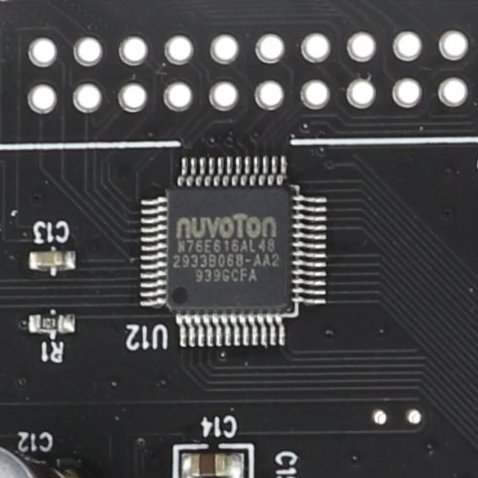
Microcontroller autoconfiguration
Thanks to an integrated microprocessor, the EVO Sabre automatically detects the format & the sampling rate of the signal source and will automatically adapt its configuration to provide the best listening performance without requiring any user intervention.
This control by CPLD chip maintains great stability while preventing decoding problems as well as the appearance of audio artifacts.
It also enables a continuous decoding of playlists with heterogeneous file types without having to worry about reconfiguring the DAC to benefit from optimal audio quality.RaspDAC EVO interface
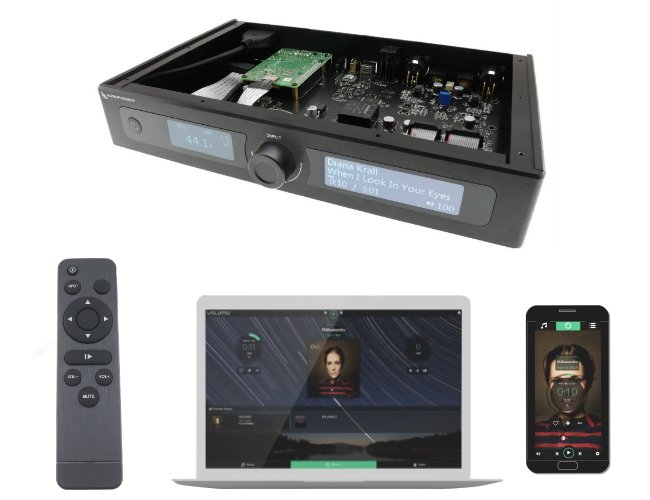
Dual Screen
The kit comes with two separate screens. The EVO SABRE audio circuit display (left) is a 1.3 "128X64 OLED screen. It simultaneously displays the active input, the sampling rate and the volume as defined by the DAC ES9038Q2M chip controller. This first display is useful to check in real time that the processing of the audio files is going as planned and in the best conditions.
A second 3.12 "256x64 OLED screen is connected to the Raspberry Pi (if present) in SPI (CN4). This secondary display can retrieve in real time the playback data at the software level (Dietpi / LMS) in a similar fashion to what our RaspDac Mini already do. This function requires that the EVO uses one of our custom distribution or that the user uses a custom display script.Front controls
A switch located on the front panel allows to turn on / off the system properly while preserving the integrity of the storage media (OS on SD card in a Pi & hard disks). It is backlit when the module is in stand-by mode but powered to indicate that the circuit is ready for operation.
The rotary encoder on the far right is directly connected to the volume control of the DAC chips. It allows easy and precise volume adjustment the from the device front panel.I/R Remote control
The infrared receiver communicates both with the microcontroller in charge of driving the DAC chips and with the Raspberry Pi if the EVO-SABRE is used in network drive mode with LIRC configured. The remote control (included) thus centralizes most of the playback functions for great ease of use.
The input selection, volume and standby functions, as well as the filters adjustements are handled by the integrated microcontroller, while the play / pause, previous / next functions are transmitted to the RPI (requires LIRC configuration on GPIO 04)Web App / LMS
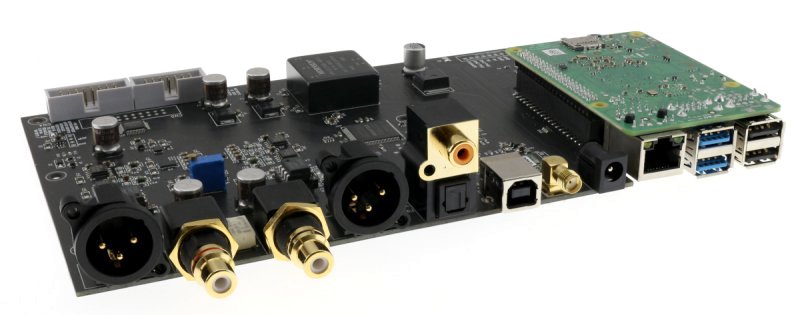
Used in conjunction with a Raspberry Pi 4, the EVO-SABRE ES9038Q2M becomes a complete dematerialized streaming solution, capable of running the best network streamer / playback solutions. This opens up a lot of options for controlling the device (playback, recovery of audio files on a NAS, online streaming service) via the network (simple web browser accessible from any connected object, dedicated applications, or your own scripts) to cover the full spectrum of possibilities and realize the full potential of your audio installation.
The pinout is the most common, compatible with the RPI-DAC driver and present in all distributions.
It is also possible to use the driver for the I-Sabre 9038, found in the Raspberry PI kernel from version 4.19.34.
This function allows access to the parameters of the DAC chips (volume, hyperstream parameters, filters) directly via the RPI and its softwares interfaces (in addition to access via remote control and controls on the front of the device).RaspDAC EVO housing
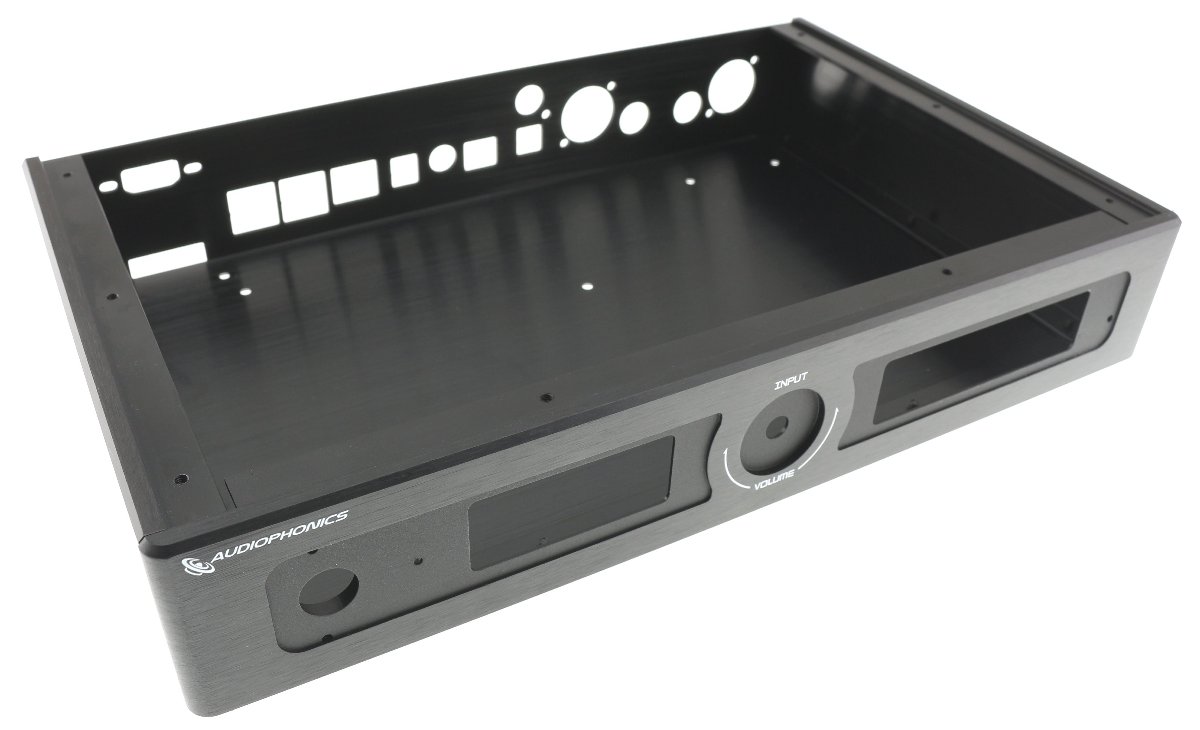
The RaspDAC EVO kit is delivered with its dedicated custom box. The latter is machined from 100% aluminum, a light, robust material that blocks any interference that may affect the audio.
The housing is pre-drilled (spacers and connectors). Its assembly comes down to fixing the various panels using the supplied hardware.Rear panel

From left to right, the connector panel has a balanced XLR output as well as an unbalanced RCA output.
Then there are the digital inputs of the DAC with coaxial connector, optical connector, USB-B input and bluetooth antenna.
Finally, the connector panel is equipped with a Jack DC input dedicated to the power supply, then the RPI 4 connectors (RJ45, USB-3, USB-2, HDMI video output as well as connector for SD card dedicated to the operating system. ).Both outputs (RCA & XLR) are active simultaneously.
The rear cover of the supplied housing is drilled to match the connectors of the RPI 4.
Optimized power stage
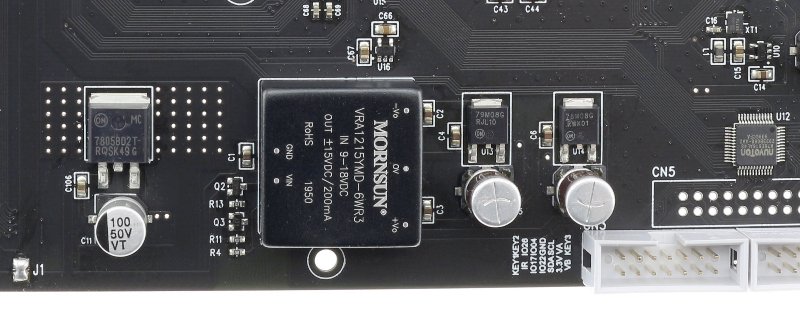
Powered by a DC 9V jack connector, the module operates from a particularly well designed power stage which allows to ensure a stable signal while reducing residual noise.
For this purpose, the PCB has a Mornsun DC / DC converter followed by two voltage regulators 79M08 / 78M08 dedicated to the analog part with is powered with +/- 8V.
The card has a separate 5V power stage dedicated to the Raspberry Pi. In this scenario, the RPI is supplied directly via its GPIO port, avoiding the need to add more connections and cables. Every configuration uses the minimum amount of cables for increased ease of use.
The card also has Ultra low noise voltage regulators dedicated to the conversion stage in order to isolate the DACs from the main power supply.
The DVCC voltage is generated from an LP5907 (regulation <6.5µV), which generates the DAC 1.2V Vref which is a critical voltage.
The AVCC voltage is generated from a dedicated ADP150 regulator (regulation <9µV).Specifications
Specifications Type kit DAC Puce DAC 2x ESS ES9038Q2M Architecture Balanced Audio Input S/PDIF Coaxial
S/PDIF Optique
Bluetooth HQ
USB-B (XMOS)
I2S GPIO (pinout RPI-DAC)Audio Output RCA unbalanced stéréo (2V RMS)
RXL balanced stéréo (4V RMS)Sampling rate USB : 768kHz / DOP256
RPI I2S : 384kHz / DOP128SPDIF : 192kHz / DOP64
Power Supply 9VDC (3A minimum) sur connecteur jack DC (Alimentation 4A fournie) Idle consumption 700ma Interface USB XMOS U208 FGPA Altera Max Housing 100% Aluminium Dimensions main board : 120 x 225 mm (Hauteur max : 32mm)
main display : 40 x 134 mm
Whole device: 185 x 300 x 55 mmWeight 1.3kg Measurements FFT
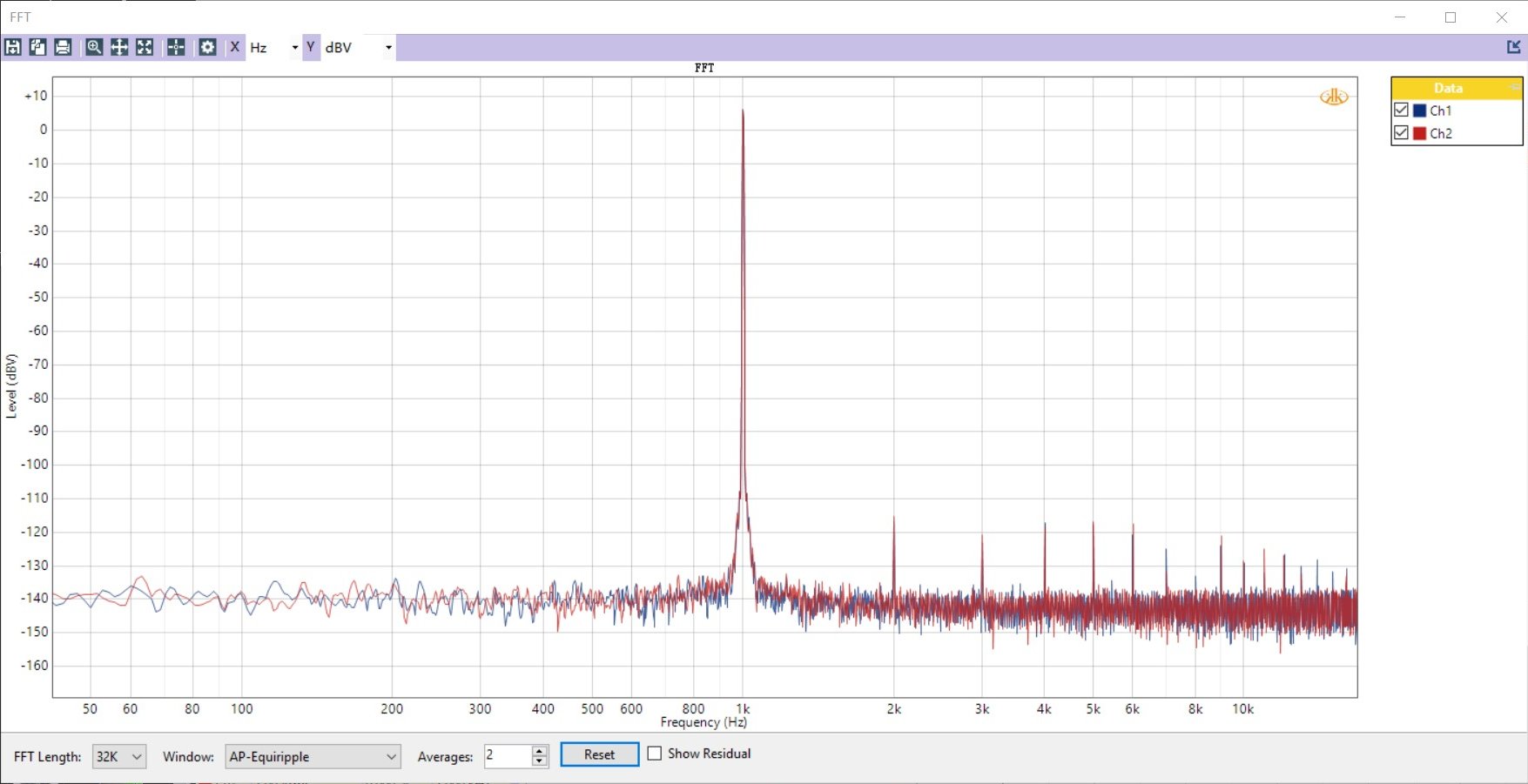
Parts included
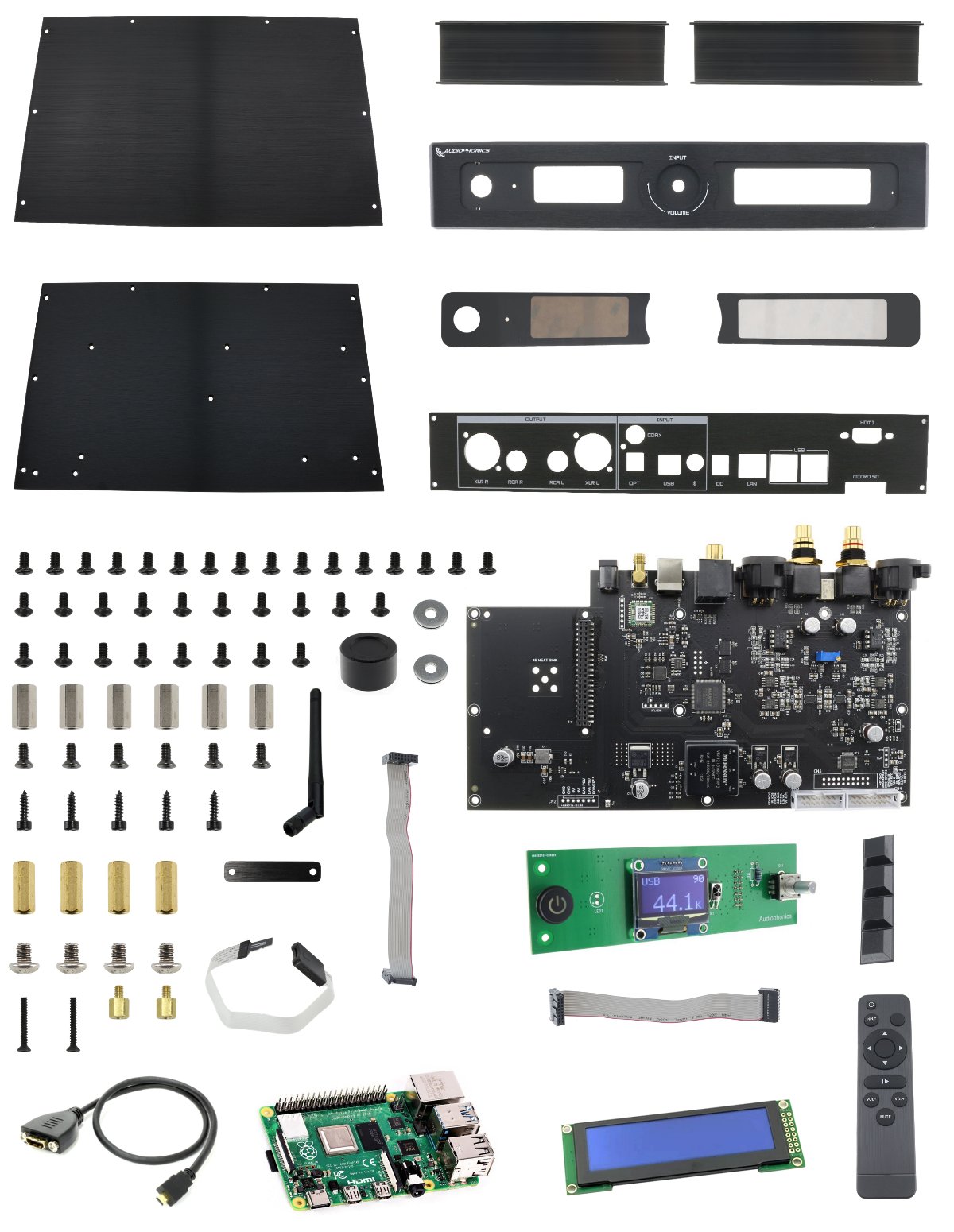
EVO SABRE Module x1 Raspberry Pi 4 x1 Main display pcb x1 Secondary display pcb x1 Display connectors x2 Remote x1 Bluetooth antenna x1 Power supply 4A x1 Power cable x1 Front panel x1 Rear panel x1 Side panels x2 Top plate x1 Bottom plate x1 Screen covers x2 M3 countersunk Phillips screw (panels mouting) x16 M3 countersunk hex screw (DAC board bottom mounting) x6 Spacers M3x 10 Female - Female (DAC board bottom mounting) x6 M3 x 5 domed screw (DAC board top & rear panel mounting) x10 M3 x 4 domed screw (display mounting) x4 Brass spacers M3 x 4 (display mounting) x2 Cable for display connecting x1 Brass spacers M2.5 x 12 (RPI mounting) x4 Domed screw M 2.5 x 5 (RPI mounting) x8
Cylindrical wood screw M3 x 10 (XLR / Optical connectors mounting)x5 M3 x 16 countersunk screw (SD card extension attachment) x2 M3 x10 washers (Secondary screen mounting) x2 Clamp for SD card extension x1 Flat axis aluminum button 25 x ⌀6mm Black x1 Extension for micro-SD connector x1 Micro HDMI to HDMI panel-mount x1 2.4GHZ SMA 3dBi Male RF Antenna x1 Polyurethane feet 3M 20x8mm x4 Input Bluetooth Input USB Input Optical Input GPIO Input SPDIF Output RCA Output XLR DAC / ADC Chip ES9028Q2M Max sampling rate 768kHz Max sampling rate 384kHz Streaming services & Network protocols Tidal Streaming services & Network protocols DLNA Streaming services & Network protocols Spotify Connect Streaming services & Network protocols Qobuz Streaming services & Network protocols Web radios Streaming services & Network protocols AirPlay Streaming services & Network protocols Tidal Connect Streaming services & Network protocols Spotify Only registered users can post a review. Log in or create an account .Average votes4.9 / 523 reviewsWhy write products reviews ?You can share your feelings about products and help other people by sharing your experienceNote :5/5Date :2026-01-14Fortuné M.
Au delà de mes attentesThis review has been posted for AUDIOPHONICS EVO-SABRE PACK DIY Balanced DAC 2xES9038Q2M & Streamer for Raspberry Pi 4
En commandant ce DAC, je ne m'attendais pas à une telle qualité... Le montage est un jeu d'enfant pour qui est un tantinet bricoleur et précautionneux. Le résultat est vraiment classe. L'installation de Volumio et son utilisation sont vraiment simples. J'ai testé toutes les entrées, le résultat est extraordinaire, du détail, spatialisation, richesse des timbres... Pour avoir mieux et clé en main, il faut investir vraiment beaucoup plus. Ça vaut vraiment le coup, mais il ne faut pas hésiter à investir dans une alimentation de qualité. Audiophonics propose des modules qui donnent d'excellents résultats audibles avec plus de détails, par exemple le PSU S4-HP. Malgré toutes mes éloges, j'ai quand même une préférence pour l'entrée coaxiale, avec comme source, le RaspTouch DigiOne qui donne à mes oreilles, de meilleurs résultats en termes de restitution avec des timbres plus riches qu'avec le RPI du DAC pour lire mes CD numérisés sur disque dur. Je recommande particulièrement ce DAC et remercie l'équipe Audiophonics pour ses conseils et sa disponibilité.Note :4/5Date :2025-08-05Laurent C.
Trés satisfaitThis review has been posted for AUDIOPHONICS EVO-SABRE PACK DIY Balanced DAC 2xES9038Q2M & Streamer for Raspberry Pi 4
Trés bon Kit bien réalisé, bien documenté fonctionne parfaitement avec un rendu impressionnant.
4/5 parce qu'on peut toujours mieuxfaire même quand c'est déjà trés bienNote :5/5Date :2024-10-24Rupert S.
La version 2 SVPThis review has been posted for AUDIOPHONICS EVO-SABRE PACK DIY Balanced DAC 2xES9038Q2M & Streamer for Raspberry Pi 4
Bonjour, ce DAC est bien noté partout ! Je l'utilise depuis qu'il est sortie et ne m'en lasse pas. Il est directement connecté à un amplificateur Audiophonics avec des modules Hypex via des connecteurs XLR.
J'aimerais voir une version II de ce DAC! Les améliorations et corrections devraient être faciles à implémenter avec le recul que nous avons à présent.
Aussi, une plaque arrière compatible Raspberry Pi 5 serait très bien venue.
Merci pour ce produit unique qui réunit tous ce qu'on peut souhaiter pour un streamer/DAC dans un boîtier compacte et à un prix abordable.Note :5/5Date :2023-10-15Gerhard K.
Excellent SoundThis review has been posted for AUDIOPHONICS EVO-SABRE PACK DIY Balanced DAC 2xES9038Q2M & Streamer for Raspberry Pi 4
On the output I run a 2.1 system (KEF LS50 Meta + DIY subs) with 3x500W class D plate amplifiers (Pascal). I came from a RPI3 + Hifiberry DAC HD2, running on Volumio, which sounded quite good to me.
But immediately, keeping Voilumio as OS, I heard quite a difference: cleaner sound, less fatiguing in the highs, more solid image, better dynamics. I can't say it way day and night, but there clearly was an improvement that justified the cost. Even my wife who is not very audiophile noticed the difference.
The RPI4 surely contributes to the responsiveness of the system (music library stored on a NAS over eth GBit), no waiting anymore, fluent switching between library, Spotifiy, Hiresaudio and Youtube. Bravo Audiophonics and thanks!Note :4/5Date :2023-03-12Werner S.
Good Dac an good Streamer wenn you find the right operation systemThis review has been posted for AUDIOPHONICS EVO-SABRE PACK DIY Balanced DAC 2xES9038Q2M & Streamer for Raspberry Pi 4
Well I had ordered the new Evo-Sabre as a complete kit at the beginning of February 2023 and it arrived within a week.
For the assembly it needs already some idea and also patience. Except for a wrong drill hole, which had no meaning, I could assemble everything well and also the first test was positive. The device looks good overall and makes a quality impression. Finally Audiophonics has a solution to switch the device on and off via a real hardware switch, including the Raspi, which is always running. The Dac itself is very quickly ready for operation and displays the sampling frequency, the selected input and the volume. The Raspi is accessible after about half a minute. Switching off or shutting down takes only a few seconds.
I took a lot of time with the choice of the operating system. First I tested the ready-made images offered by Audiophonics. The following comments are brief:
Volumio: makes at first a quite passable impression, but even after longer trying and reading in the forum, my embedded art covers could not be displayed correctly.
Moode: didn't work for me, especially the integration of my music collection didn't work and the cover images weren't displayed.
DietPi: altogether also not successful and only after much reading I got further so that at least the LMS server ran.
Then I downloaded the latest PiCorePlayer and from then on everything worked as I wanted. So this is the operating system of my choice. I could also set everything with a little reading up immediately and according to my ideas. After that, the LogitechMusicServer ran immediately and it was displayed, for example, all my cover images. I use for operation on the smartphone (Android) the Material Skin with the Kiwi Browser, which looks very good and also provides a lot of additional information about music and artists with the appropriate selection of plugins. I must say that I already knew and used the LMS before, so it was familiar to me again quickly.
The right display have not brought to run, but in the forum there is a script where it should be possible. I do not need the (right) display, because I see everything via the smartphone app.
Summary: overall a good device that I would buy again. The price is reasonable for me especially as a complete kit with Raspi. The converters are also very good and it sounds very nice in my very high quality system.
My request to the Audiophonics team would be to adapt the illustrated instructions to the current state and to give more instructions in a few places (e.g. installation of the display cover).
It was very good for me that I received several answers to my questions about details in advance (before I ordered the device). Thanks for that.No products
To be determined Shipping0,00 € Tax0,00 € TotalPrices are tax included


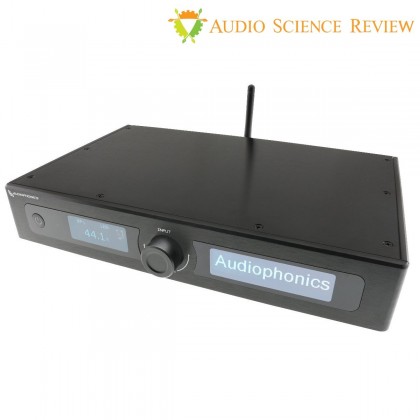







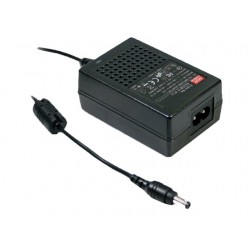
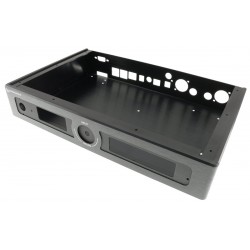







![[GRADE A] GUSTARD X26III DAC 2x ES9039SPRO NOS Streamers LAN Roon Airplay UPnP 32bit 768kHz DSD512 Black](https://www.audiophonics.fr/70815-thumb_default/gustard-x26-iii-black-sba.jpg)
![[GRADE B] EVERSOLO AMP-F2 Amplifier Class D 2x250W 4 Ohm / 1x450W 2 Ohm](https://www.audiophonics.fr/70803-thumb_default/eversolo-amp-f2-sbb.jpg)
![[GRADE A] XDUOO TA-32 Balanced DAC Class A Tube Headphones Amplifier Bluetooth 5.1 aptX HD LDAC 32bit 768kHz DSD512 MQA](https://www.audiophonics.fr/70796-thumb_default/xduoo-ta32-sba.jpg)


















